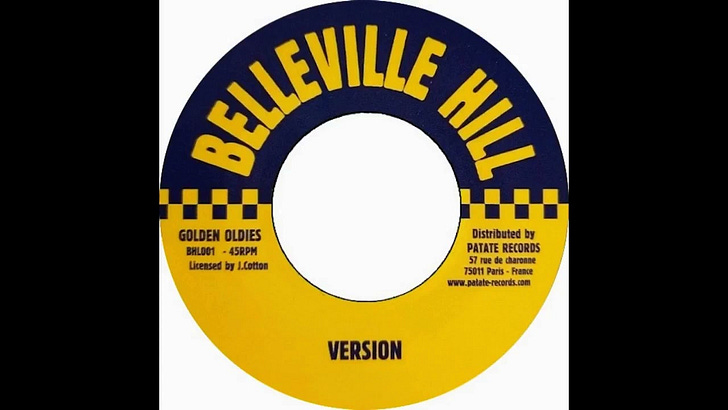5 Songs Friday, Apr. 18, 2025
2 From Jamaica, 1 from Latin Jazz Rock, 1 from Jazz Vocals, and 1 from Pop Country
Ken Boothe & Jah Walton “From Jamaica to Nigeria” 1979 single available on Got to Get Away Showcase. Ken Boothe is a crooning reggae vocalist with an ability to be smooth and gritty and back again in just a single phrase. But you’ll barely hear him on this DJ version built on the riddims of Boothe’s “Who Gets Your Love.” Jah Walton, later known as Joseph Cotton, toasts hard and fast with extensive reverb and other dub affects making the record eerie and mysteriously intoxicating. Walton’s lyrics are about an imagined return to Africa, land of his ancestors. He may not be as inventive as some of the giants of reggae toasting, but he’s possibly more emotionally intense. This record moves me in different ways than anything I’ve heard from U-Roy, to my ears the greatest of all toasters.
Santana – “La Fuente del Ritmo” 1972 from Caravanserai. Album number 4 from most of the original line-up, and the record that Clive Davis declared would be career suicide for Carlos Santana. Last I checked, Santana is doing all right on the concert circuit. Most of the songs on this album are instrumentals, moving towards a jazz-fusion sound with plenty of Latin percussion keeping things danceable. This instrumental cut was written by James “Mingo” Lewis, who normally handled bongos, congas, and other percussion instruments, but who played piano here. The album was originally mixed in the next big thing that wasn’t, quadrophonic. Considering the way this song pairs with weed and headphones for the mind-bending Carlos Santana guitar solo that pans back and forth, I can only imagine that sound bouncing all around the room in 4-speaker beauty. At the beginning of his solo, Santana’s guitar is mirrored by that of Neal Schon – I can never figure out how Schon and organist Greg Rollie could be so great in this band and go on to be in one of the worst commercial successes of all time, Journey. The rhythm here is extremely propulsive, and there are several different instruments blurring together handling all the possibilities on that front. Lewis’ piano is practically playing salsa, while Santana’s guitar and Rollie’s organ hold back for more spiritual intensity. I love this cut.
Dinah Washington – “Smoke Gets In Your Eyes” 1956 from Dinah! I’m fairly sure I’ve talked before about how much I enjoy Dinah Washington, but it’s been a while. Here we have a lovely example of her artistry as she tackles this classic Jerome Kern / Otto Harbach number. It’s got a powerfully direct melody which Washington hugs to her breast. All of her dynamic control is present here, as she emphasizes certain words or phrases with long, louder, vibrato-laden notes, but always restraining herself from going over the top. She does build up for a final crescendo, but even here she clearly holds back from what we know that voice is capable of. The lyrics of this song reveal the singer to have shitty friends – when she’s in love, they tell her it’s not going to last, and when it ends, they laugh and deride her for crying. There’s a lovely jazz combo backing her up – Wynton Kelly is playing piano, and Jimmy Cobb drums, both of whom would be part of Miles Davis’ Kind of Blue album just three years later. Harold Mooney’s strings play a pivotal role in giving Washington a soft bed of support, too.
The Upsetters and Prince Jazzbo – “Croaking Lizard” 1976 from Super Ape. You know how it is. “Chi bam, chi bam, chi bam bam bam, di natty dread skank.” According to a post on Reddit, this roughly means “Who feels it, knows it,” a phrase which, I believe, originated with Bob Marley and which might as well be part of the definition of reggae music. Super Ape is one of the all-time classic dub albums produced by Lee Perry with his band of Jamaican studio pros the Upsetters. Prince Jazzbo is one of the longest-tenured Jamaican toasters, who, I believe, is still out there performing today. He takes hold of this deep rootsy groove, augmented by Perry’s knob twiddling at the mixing board, and never lets go. He’s got more variety than Jah Walton does in the cut above, and he’s trying to achieve a state of bliss here. He comes darned close to getting me there, too.
Kathy Mattea – “That’s Easy For You to Say” 1984 from Kathy Mattea. Mattea was 25 years old when she released her debut album. This was her fourth single to hit the country charts, though it never climbed higher than number 50. Written by Deborah Clifford and David Hodges, this is a pop song that could easily have been recorded by the likes of Sheena Easton, but I think Mattea’s vocals are more perfectly suited for it. Her man has dumped her unexpectedly, saying all the usual cliches that people say in those circumstances, such as “I hope we can still be friends” and “you’ll find somebody else,” but she isn’t so ready to move on. The title hook keeps all the pain and confusion just at the back of her throat as she gets ready to dismiss him with “You think love’s a place to hang your hat / But it’s not like that for me.” Mattea would go on to major success on the country charts for a long time, and then to reinvent herself as an indie country artist after that. But this is the sort of fine thing she was doing at the beginning of her long career.


